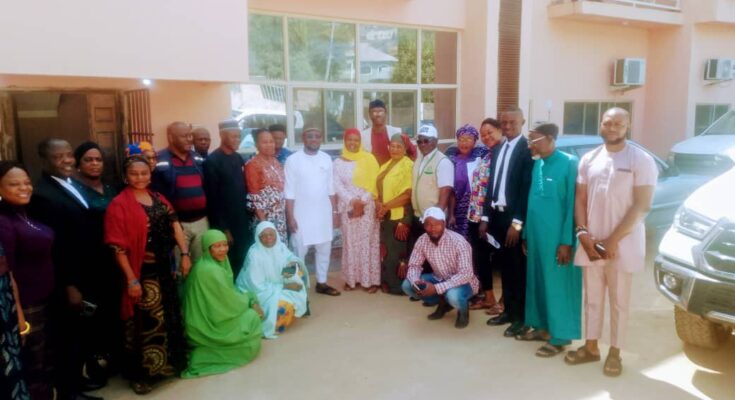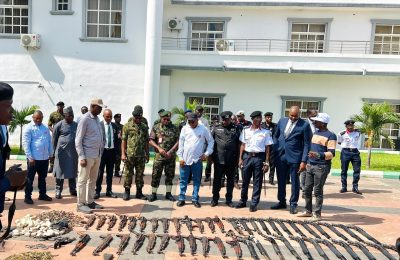UNICEF, KSPHCDA seek stakeholders’ support for improved awareness on BCU vaccination in Kogi
The United Nations Children’s Fund (UNICEF) has called for improved stakeholders’ support in raising public awareness on its Big Catch Up (BCU) vaccines initiative, aimed at restoring immunisation progress lost during the COVID-19 pandemic.
Amb. Dr. AK Hudu, UNICEF SBC/BCU Consultant, made the called in his paper presentation at a one-day stakeholders town hall meetings, for BCU activities for routine immunisation (RI) intensification in Lokoja.
According to Hudu, by supporting the BCU activities, UNICEF and its partners aim to protect children from vaccine-preventable diseases, reduce the risk of outbreaks, and promote overall health and well-being.
Hudu pointed out that the BCU activities was aimed at restoring immunization progress lost during the COVID-19 pandemic, with a focus on vaccinating millions of children who missed out on essential vaccinations due to the pandemic.
While speaking in Social and Behavioral Change (SBC), Hudu defined it as a people-centered approach to understanding problems and influencing change.
He added that SBC empowered people to take actions and make positive changes in their own lives, using community insight, as well as a multidisciplinary approach that draws various fields together.
He, therefore urged stakeholders to help in raising adequate awareness on the BCU activities, while calling on governments to improve policies and services to enhance vaccines uptake.
In his remarks, the Executive Director (ED) KSPHCDA, Dr Musa Muazu, commended the UNICEF and other partners for their unwavering support for the state towards achieving its universal health coverage.
Muazu reaffirmed the commitment of Gov Ahmed Ododo’s administration to ensuring an improved quality healthcare delivery to citizens especially at the grassroots.
He, however stressed the need for the health officers and the relevant stakeholders to be committed to their various responsibilities towards effective service delivery for the betterment of the state.
The ED further called on the political office holders especially the local government chairmen to help in championing the upcoming BCU activities in the respective areas to ensure full participation.
Speaking on the “Roles of Stakeholders in Advocacy Communication and Social Mobilisation for BCU”, Mr Shittu Momoh, State Health Educator, urged stakeholders to raise awareness and knowledge on vaccines and routine immunisation (RI) schedule through targeted messaging.
Momoh stressed the need for stakeholders to keep reassuring communities of vaccines safety and effectiveness by addressing myths, misconceptions and rumours about vaccines.
He further called for stakeholders’ support for effective dissemination of messages, house-to-house, door-to-door and community mobilisation especially in hard-to- reach areas.
“It is our collective responsibility as stakeholders to channels our efforts in enlightening the people and promoting vaccines as preventive measures for vaccine preventable diseases in a socially and culturally acceptable manner,” he said.
On her part, Mrs Ajuma Apeh, the State Immunization Officer (SIO), who spoke on “Key Messages About Vaccines and BCU Activities”, said the vaccination comprised of oral polio vaccination (OPV) for children age 0 to 59 months; Measles, aged 9 to 59 months.
Other are Humanpapilloma virus vaccination (HPV) for girls, aged 9 to 14 years; Routine immunisation, aged 0 to 23 months; Yellow fever for everyone, aged 9 months to 44 years; and Tetanus diphtheria (Td) for girls and women, aged 15 to 49 years.
She said that the BCU vaccination campaign activities would begin on 6th to 11th January, 2025, across seven local government areas of Ankpa, Olamaboro, Dekina, Ofu, Ibaji, Bassa and Kogi.
According to her, key aspects of BCU activities include: closing immunization gaps by focusing on areas with low vaccination coverage and targeting vulnerable populations; restoring immunization progress; and strengthening health systems.
The meeting which was organised by the Kogi State Primary Health Care Development Agency (KSPHCDA) in collaboration with Partners, were attended by Traditional and Religious leaders, NGOs, CSOs, MDAs, Media, Sultan Foundation, among others.
The stakeholders in their various comments, commended the UNICEF and partners for their commitment to improving quality healthcare delivery in the state and the nation at large.
The stakeholders promised to intensify their efforts in raising awareness through dissemination of messages through public statements, public events, interpersonal communication, among others.
End




